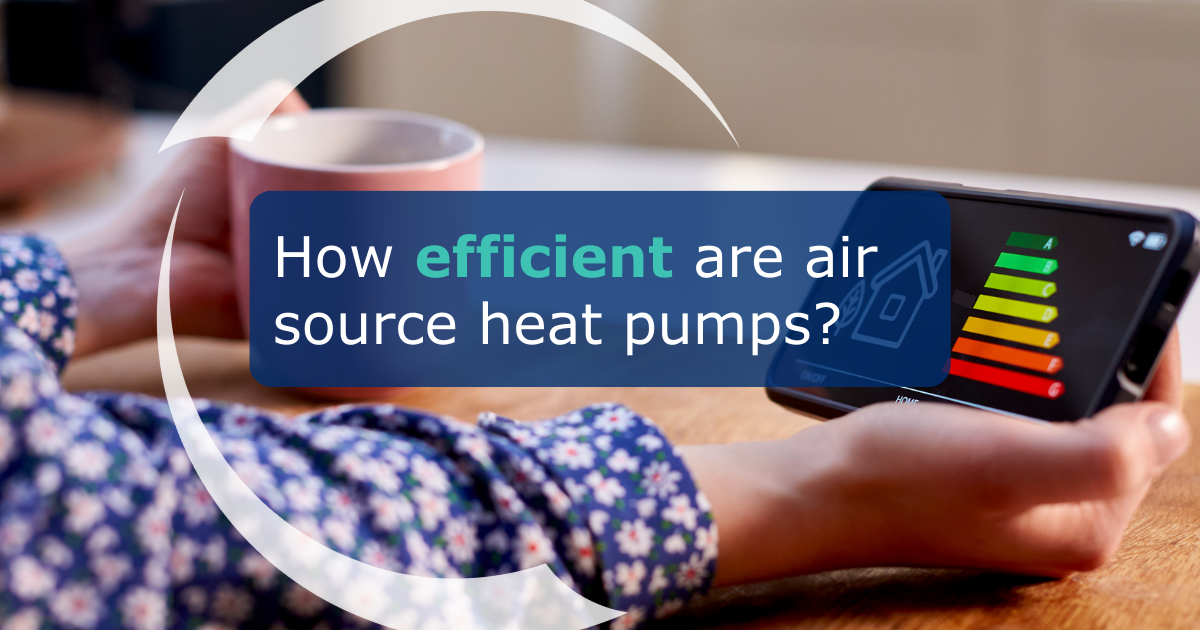How efficient are air source heat pumps?
Air source heat pumps are are one of the most efficient ways of heating your home. They can produce three times more heat than a traditional gas boiler and are 300% more efficient.
They are a sustainable, low-carbon option to heat your home and hot water, helping you save energy and money.
By installing an Air Source Heat Pump – you can:
- Increase Energy Efficiency by 300% (1)
- Reduce Carbon Emissions by 80% (2)
- Save £240 a year on energy bills (3)
What affects the efficiency of an air source heat pump?
Several things effect heat pump efficiency, including:
- Temperature: The difference between the outdoor temperature and the flow temperature of the heat pump affects its efficiency. As it gets colder, heat pumps become less efficient. However, all MCS registered heat pumps are designed to work well in very cold weather. They will keep your home warm even on the coldest days. In fact, heat pumps can still work in temperatures down to -28.
- Design: A properly sized heat pump will operate more efficiently. Am undersized heat pump that is too small might not provide enough heat for your home. On the other hand, an oversized heat pump may turn on and off too often. This can lower its efficiency. It’s critical that your heat pump is designed properly to meet the needs of your property to ensure its sized correctly.
- Insulation: If your home is well-insulated, a heat pump doesn’t work as hard, as your property can retain its heat better. Proper insulation helps prevent heat loss through walls, roofs, and windows.
- Maintenance: Just like any heating system, regular maintenance helps your heat pump work at its best.
- Radiator size: The size and type of your radiators can affect efficiency. For example, radiators with larger surface areas are more efficient. This is because the heat pump does not need to work at a high temperature. Underfloor is also a great option due to its larger surface area.
- Weather compensation: Getting the weather compensation right can help improve efficiency. Using an outdoor sensor, your heat pump adjusts its settings to make the most of the natural heat in the air.
- Hot water: Making sure the hot water isn’t set too hot can help improve efficiency. Most heat pumps are designed to emit hot water at temperatures between 45-50°C, which covers most needs (without burning yourself).
Will it cost me more to run?
Running costs can vary on several factors such as your energy tariff, and the performance of your heat pump. With today’s electricity prices, using an air source heat pump should cost about the same as a regular gas boiler.
If you’re replacing an older, G-rated gas boiler, you could save around £290 a year on your energy bills (4).
You can save even more by switching to a heat pump tariff. For example, the EDF heat pump tariff lets you pay less for running your air source heat pump during specific times.
To read about heat pump costs in detail, click here.
How to improve heat pump efficiency
There are several things you can do to keep your air source heat pump running at maximum efficiency, including:
- Ensure your radiator thermostat valves (TRVs) are set to their highest setting.
- Make sure you bleed your radiators when you need to.
- Ensure weather compensation is set up correctly.
- Leave your air source heat pump turned on all year round.
- Ensure your hot water schedules are set up correctly.
- Keep windows closed on colder days (reducing heat loss).
- Don’t alter the settings of your air source heat pump without first consulting an expert.
- Look at dedicated energy tariffs which make running costs cheaper.
- Look into the benefits of solar panels to power your home and heat pump.
- Keep it clear from snow, debris, and obstruction, allowing for good airflow.
Can heat pumps really be 3x more efficient than a boiler?
Yes, they can.
Air source heat pumps can be 300% efficient, if not more in some cases.
Heat pumps can produce 3 kW of energy for every 1 kW of electricity they use. This is called the Coefficient of Performance (CoP). If a heat pump has a CoP of 3.0, it produces three units of heat for every unit of electricity it uses.
A gas boiler uses 1 kW of gas to produce only 0.85 kW of energy. This shows how much more efficient an air source heat pump is compared to a traditional gas heating system.
How is this possible?
Gas boilers create energy by burning fuel. They ignite a volume of gas, which releases energy. This means you can’t ever release more energy than is stored in that volume of gas. This means a fuel-burning system can never achieve more than 100% efficiency.
For example, when you start a fire with wood, you can only get energy from that wood. Once you burn the fuel, you get heat, but the wood is gone. There is no more energy left!
Air source heat pumps do not create heat. Instead, they take energy from the air. This energy changes the refrigerant’s state. The refrigerant is then compressed to produce heat. This useful heat is then transferred to the water that runs around the central heating system.
Since they don’t burn fuel, their efficiency relies on how well they can transfer energy from one place to another. As technology improves, there’s no theoretical maximum to how efficiently you can move energy. This means we could see systems getting to be four, five, or ten times more effective at moving energy in the future. It’s simply an engineering problem!
For now, they are one of the best options compared to traditional gas boilers. They offer great efficiency, savings, and sustainability.
Can they really keep me warm in freezing temperatures?
Yes, your system may be less efficient in the winter, but it will still keep you cozy and warm.
MCS requirements mean that all systems must be designed down to sub-zero temperatures which is more than adequate for the UK climate. Furthermore, each system is designed to keep your home warm in freezing temperatures.
If you live in a cold area where temperatures drop below zero, you may notice some efficiency changes. However, it won’t leave you out in the cold. Most air source heat pumps are designed to work in temperatures of up to -15C. The average winter temperature in the UK is between -2°C and -7°C. Your heat pump can handle this cold weather easily.
Do heat pumps work in winter when it snows?
It’s been written in the media and online that air source heat pumps are not suitable for the UK climate. This isn’t true.
An air source heat pump takes energy from the outside air. It then turns that energy into heat for your home and hot water, even when it’s very cold outside. There really shouldn’t be anything to worry about when the weather gets colder.
In the winter, your air source heat pump works no differently. Your heat pump is great for the UK climate. It can work off-grid and still run when it’s as cold as -15°C. Even in very cold temperatures, air still has thermal energy. Air source heat pumps take this heat and move it into your home using refrigerant. This will boil even in sub-zero temperatures. Your air source heat pump works in winter just like it does the rest of the year. It will just work a bit harder in winter, similar to how your old gas boiler did. Your external unit is sealed and has been designed to withstand all the weather that the UK climate can throw at it.
A good air source heat pump system, made for your home and local weather, will keep you warm in winter. It will also give you all the hot water you need for many years.
How does it work in the snow?
Most heat pumps today have a built-in defrosting and de-icing feature. This keeps the fans clear, so your heat pump works when you need it.Never pour boiling water over your heat pump to defrost it. Your heat pump is an electrical appliance and doing so is highly dangerous and will damage your unit.
If snow is affecting your home, try to go outside if you can and clear the snow away from the outside unit. This is no different to how you would keep your driveway and paths clear to access your house.
You could also consider a custom-built cover that has been specifically designed for your air source heat pump. We do not suggest making one yourself. It could block the airflow of the unit. Talk to your installer about the options you have.
Will it cost more to run in winter?
In short – yes.
Just like any heating system, you will use more energy in colder months. This is because of the outside temperature and how quickly your home loses heat. An air source heat pump is like any other heating system in those colder months. As your home loses more heat, more heat is required to keep it warm.
In winter, your heat pump will use more energy, similar to your boiler. This can lead to higher energy bills, depending on your tariff. The key point to remember is that, over the year, you would still use three times less energy than a boiler. This means you can save some money too.
Keep in mind that even if the savings on your energy bill aren’t huge, you are still helping the planet. By using less energy, you reduce carbon emissions and create a better world for future generations. Fitting your home with the latest technology can also increase its value.
Electricity costs
If you’re making the switch to an air source heat pump, you’ll be moving to a fossil-free system. Your air source heat pump will draw energy (heat) from the air around it.
When we discuss the energy used by an air source heat pump, we mean the energy needed to run it and pull heat from the air. For Example – Heat pumps use 1kW of electricity and produce 3kw of heat. A household that uses 12,000kw of gas a year, will only need to use 4,000kw of electricity to produce the same amount of heat – that’s a huge saving on energy and carbon.
Make even greater savings
Right now, electricity prices are higher than gas prices. This means that using an air source heat pump will cost about the same as your average gas boiler. If you’re replacing an older, G-rated gas boiler, you could even save around £240 a year on your energy bills (4).
However, there is a way to save even more. Switching to a heat pump tariff, like the EDF Heat Pump Tariff, could lower your costs. You pay less for running your heat pump during specific times. This helps reduce your electric bill. By scheduling your hot water use and using a smart meter, you can save money on your heat pump costs.
If you have solar panels, an air source heat pump could be the perfect choice. The power (electricity) that is produced can also be used to power your heat pump so you can reduce your energy bill even more.
Installation costs
Every heat pump installation we carry out is specific to your home and your personal requirements. There are a wide range of factors that need to be taken into account before we can give you a dedicated quote. You can get a complete heat pump system that fits your needs. If you are eligible, the £7,500 Boiler Upgrade Scheme (BUS grant) and other easy monthly payment plans can make it more affordable than you think. Our custom design service will ensure the system is installed just for you.
Air source heat pumps may cost more at first than gas boilers. However, they last longer and are more efficient. Running costs for a heat pump can change. Factors like your energy tariff, the type of heat pump, and its size all affect these costs. The benefits of an air source heat pump system will outweigh the initial costs over time. You should save money in the long run. We explore more about costs in our dedicated costs page.
Thinking about a heat pump but not sure?
We’ve been installing air source heat pumps for over 20 years now. Backed by EDF, we know we can create the perfect heat pump system for you. What’s more, our systems are underpinned by the Heat Pump Promise. If your heat pump doesn’t work as promised, we’ll give you a refund.
So, if you’re just starting to look into the options, or have a few questions, drop us a message below and we’ll give you a call back.



